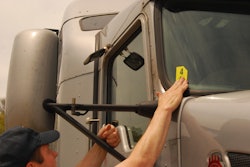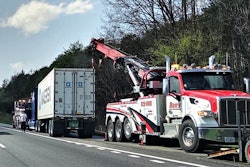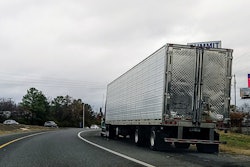After the truck payment, truck insurance is certainly one of an owner-operator’s biggest fixed costs, one that must be paid whether a truck is running hard or parked. There's a reason for that, particularly for owners operating with motor carrier authority -- risk is high on American roadways, and insuring a trucking business against it can come with a steep price tag.
Yet it's a must, and understanding what you're buying with any insurance policy is key, too. Read policies looking for various “terms and conditions” including what driver qualifications the policy requires, the radius of operation listed, hazmat exclusions and other terms that might be putting you at further risk.
“Coverage exclusions” are especially important so you don’t end up responsible for an entire repair or loss. Without adequate insurance, an accident or cargo claim could mean financial ruin.
How much does it cost?
Your age, your driving record, the age and condition of your equipment, the commodities you haul, the lanes you run and state requirements all affect insurance costs. Other factors that can impact your rate include your credit reports, business address, severity of the items on your Motor Vehicle Record, prior insurance claims (including those in personal vehicles), and even your CSA scores. An owner-operator with a new truck and trailer and his own authority is likely to pay:
- $10,000 or more a year for $1 million in primary liability insurance, otherwise known as commercial auto insurance. This covers damage or injury done to others in an accident. In the wider insurance market, some insurers have exited the commercial auto liability business entirely. Combine that with fast-rising awards in civil trials following accidents, and liability pricing has continued to go skyward.
- $5,000 a year for physical damage insurance, though there's great variability in this cost depending on the age/value of the equipment covered. This covers damage done to your truck and trailer in an accident.
- $1,000 or more a year for cargo insurance. This covers damage to or theft of the load you’re hauling. Typically, $1,000 or $2,000 deductibles are available.
- $630 or more a year for $1 million worth in non-trucking-use liability insurance. Often called “bobtail insurance,” though not necessarily the same, this covers damage or injury to others in case of an accident while you’re not under dispatch.

All that insurance can add up to $20,000 or more per year, assuming a safe driving record. Cited speed demons can pay much more. For liability insurance, newly established owner-operator businesses in some cases pay that much for liability alone, which can be prohibitive for operating with good profits.
Leased owner-operators generally carry just as much truck insurance but pay for less of it themselves. The leased operator should make sure the lease agreement specifies what he is not responsible for, often primary liability and cargo insurance, and what he is responsible for, typically physical damage and non-trucking liability insurance. Some fleets charge the owner-operator for primary liability and cargo insurance, usually by taking a percentage of all settlements, but other fleets absorb those costs, something to keep in mind when evaluating a high percentage-pay-based contract. Part of a high percentage of every load's revenue going to the owner-operator could be effectively eliminated to pay for liability/cargo insurance chargebacks.
Owner-operators shopping for bobtail (operating without the trailer) or nontrucking (personal use) liability insurance can look to trucking-specific insurance agencies (see below) or truck dealers -- or buy direct from the insurance company itself. Shop for the most coverage at the most reasonable cost.
Some leased owner-operators buy all their insurance independently of the plans offered by their fleets. This costs more in most cases, but its advantages include more control of your coverage, a closer business relationship with your agent and a speedier reply when you have an emergency. Better yet, independently purchased insurance is portable, so if you and your fleet part ways, you’re still covered en route to the next orientation. Before you can be assigned a load, you’ll have to show your carrier proof you have all the coverage it requires.
With trucking insurance costs rising so much in recent years, it can be quite difficult for a startup operation with authority to afford initial insurance. Some factoring companies may offer the option of letting a client defer up to half of an insurance downpayment and to repay it through factored loads.
[Related: Yes, you can reduce your trucking insurance premium ... and I have the customers to prove it!]
Put an insurance agent on your team
Many owner-operators, whether leased or independent, rely upon a dedicated truck-insurance agent. An agent who knows the trucking industry and your business plan can help assure you’re always covered and can make your premiums.
Get the company’s name, and check it out for free at the A.M. Best website, which ranks each insurer according to its financial viability. Sticking with A-rated insurers is the best policy because they offer better coverage and faster turnarounds on claims.
The chief question to ask of an insurer is how quickly it can get you back on the road. Other questions include:
- Does the policy cover a truck rental while your rig is in the shop?
- How quickly can you reach the agent in case of emergency? This isn’t just a convenience for the policyholder; good insurers want to be notified as quickly as possible in case of an accident.
- Does it have a 24-hour claims hotline number?
- Can you reach your personal agent quickly, perhaps through a cell-phone number?
Don’t call your agent only in an emergency, though. Even drivers with 2 million safe miles need to check in with their agents regularly. Let your agent know when anything changes – new equipment, new routes or a new driving partner. Call whenever you’re considering hauling something unusual, such as a reefer load if you’re typically a dry van hauler.
Longtime Overdrive contributor W. Joel Baker, an independent owner-operator for decades who's now working with small fleets and owner-operators as an insurance agent, can be a resource for all manner of insurance questions. Find all of his authored stories with helpful tips and information via this link.
Read next: Commercial auto liability: Independents' biggest insurance expense










